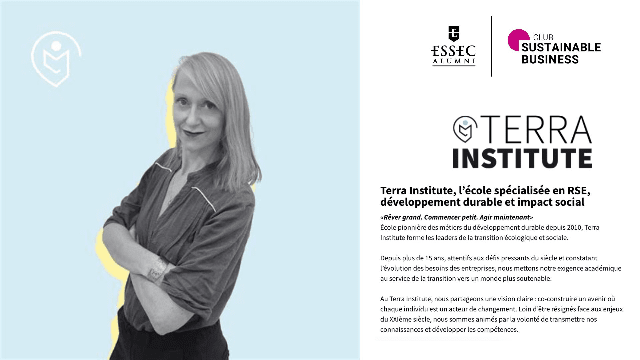#1Month1EngagedAlumni: Céline Degrave (E05) – “The ecological and societal transition has now become a mainstream issue across society.”
10.06.2025
Graduate of the ESSEC Grande École program, Class of 2005, Céline Degrave now heads Terra Institute, a school dedicated to training professionals in sustainability and impact. Discover her journey and her almost philosophical vision of “CSR.”
E.S.B.: What is your background, and what led you to take an interest in CSR?
C.D.: I began my career in Marketing and Communication (in the tourism sector), before—by sheer coincidence—opening Pandora’s box: La Fabrique de la Ville et des Territoires. As Chief Operating Officer within a “responsible” real estate investment company, I discovered the world of Third Places, the Social and Solidarity Economy, and innovative urban projects—a perfect mix of all the questions that challenge the very “sustainability” of our societies.
After 15 years of professional experience, I wanted to focus on transmission: rather than constantly trying to fix what was poorly designed, couldn’t we start things off right from the beginning? Can we learn how to make the world run more smoothly? How do we teach the principles of ecological and societal transition?
That’s how, three years ago, I became Director of Terra Institute, a school offering 5-year programs in Sustainability and Impact, through two tracks: CSR–Sustainable Organizations and Sustainable Cities.
E.S.B.: What does CSR look like in your daily life?
C.D.: As the Director of a school that trains future CSR professionals, my role is to constantly question what lies behind this acronym—the definitions we give it, how it evolves, its potential, and its limitations.
Today, it’s fair to say that CSR is a shaken concept: while some see it as “the greatest scam ever made” (see Trump’s speech at the UN General Assembly a few days ago, in September 2025), others criticize it for lacking ambition and serving greenwashing purposes.
CSR must once again become a compass for companies, organizations, and civil society—even if it means reinventing itself entirely!
E.S.B.: How do you define CSR?
C.D.: Precisely, I advocate for a redefinition of what the acronym Corporate Social Responsibility truly stands for in our collective imagination. As soon as we talk about CSR, people think of regulations, constraints, data, and an enormous amount of energy spent on reporting rather than implementing action plans.
We need to return to a more systemic and philosophical vision: CSR should enable the company to play its role as a structuring element within an ecosystem—one that gives as much as it receives, contributes to a dynamic balance, and serves a useful purpose so that the whole can function sustainably.
But it must do so consciously—not merely for its own survival. Justice, solidarity, and morality form the triptych that distinguishes our societies from other living ecosystems.
E.S.B.: How is it a business catalyst, and what kind of ROI are we talking about?
C.D.: I’m not sure CSR, in itself, is a direct business catalyst.
What’s certain, however, is that CSR has increasingly become a form of risk management for companies—addressing issues such as resource scarcity or rising costs, supply chain disruptions, access to financing, legal or environmental disputes, reputational crises, and employee engagement and productivity. These are all levers that directly affect a company’s overall performance and long-term viability.
Moreover, CSR can be a true source of business opportunity: in the context of the functional and cooperative economy, we can create models that are 25 to 40 times more profitable than linear ones (see Luc Teerlinck’s excellent book “Et si on ouvrait d’autres voies ?”).
E.S.B.: What message would you like to share with ESSEC Alumni Club members and others?
C.D.: First of all, the ecological and societal transition of companies and organizations is not just the CSR manager’s responsibility. All core functions and roles within organizations are more relevant than ever.
Furthermore, we are not experiencing a “CSR backlash” but rather the end of a successful awareness phase. Ecological and social transition has now become a mainstream societal issue.
We must therefore move beyond activist postures and divisive rhetoric, which tend to alienate too many stakeholders. Instead, we should identify and define what unites us collectively: the defense and preservation of our living conditions. These must now guide our words and actions—as leaders, employees, and citizens.
(On this topic, see the excellent paper by IDDRI / Parlons Climat, “Towards a Majoritarian Pivot for Ecology.”)

Comments0
Please log in to see or add a comment
Suggested Articles





